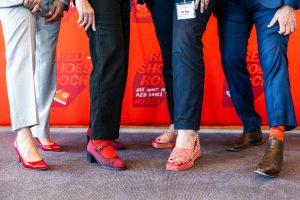The Foundation for Alcohol Research and Education (FARE) and Berry Street are calling on governments to keep families and children safe from the harms from online sales and delivery of alcohol.
A new report by FARE has found children are being put at risk as alcohol retailers in Australia are not required to verify proof of age identification when selling alcoholic products online.
Examining the controls that are in place online to prevent alcoholic products from being sold to children, the report found that none of the online alcohol retailers reviewed used point-of-sale age verification to confirm age.
The need for action by governments comes as the report also found that 2020 saw total website visits to online alcohol retailers increase to 148 million, a 37 million (34 per cent) jump in website traffic compared to 2019. The four biggest online alcohol retailers were visited an estimated 134 million times in 2020. The growth between 2019 and 2020 is more than triple the website traffic growth seen between 2018 and 2019.
FARE CEO, Ms Caterina Giorgi said that there has been a rapid growth in online alcohol sales in Australia and it’s important we close the loopholes to help keep families and communities healthy and well.
“The checks and balances that we expect as a community to be in place to ensure that alcoholic products are not sold to children are not there when alcohol is sold online,” Ms Giorgi said.
“For most of Australia, there are no measures in place ensuring alcohol companies verify people’s age when they buy alcoholic products online.”
Michael Perusco, CEO of Victoria’s largest child and family services provider, Berry Street, agrees more needs to be done to ensure young people aren’t so easily able to access alcohol.
“At Berry Street, we support and care for some of the most vulnerable children and young people in our community, including those who aren’t able to safely live with their families,” Mr Perusco said.
“For too many, alcohol appears to be an easy escape. But it only adds to the complexities and challenges they face as they seek to recover from their trauma.
“Being able to shop online has made it harder to protect young people from buying alcohol. Governments need to do more to ensure alcoholic products cannot be sold to children,” Mr Perusco said.
Ms Giorgi said there are digital age-verification solutions that alcohol retailers could implement.
“Governments have the opportunity to ensure we are doing all we can to keep families and communities safe by introducing common-sense measures including requiring age verification when alcohol is sold online,” Ms Giorgi said.
Background
- In 2020, total website visits increased to 148 million, of which 134 million visits were to the four largest online retailers, Dan Murphy’s and BWS, owned by Endeavour Group, and Liquorland and First Choice, owned by Coles.
- Overall, the assessed websites saw a significant increase in traffic from 2019 to 2020. In 2020, the websites reviewed had an estimated 34 per cent increase or 37 million more website views compared to 2019. This was over triple the website traffic growth seen between 2018 and 2019.
- Almost all websites experienced visitor growth beyond 20 per cent from 2019 to 2020. For most of the websites (7 of the 9), this growth far exceeded their previous growth rate for 2018 to 2019. Particularly high growth was seen by Dan Murphy’s with 39 per cent growth in 2020 (an additional 22 million views) and Boozebud with 94.7% growth (an additional 2 million views)
- Online alcohol retailers include a range of companies that sell packaged alcoholic products to people over the internet.
- Online alcohol retailer revenue has increased at an average annual rate of 19.1 per cent since 2016, bringing the revenue to an expected $1.8 billion in 2021.
- Endeavour Group is the largest online alcohol retailer, accounting for 47 per cent of online alcohol retail sales in Australia and Coles Group, the country’s second largest online retailer, has the next largest share at 13.8 per cent.
- The revenue for online alcohol retail rose by 22 per cent in 2020, surpassing previous growth rates. IBISWorld expects this record growth to continue into 2021, with growth of 27 per cent.







